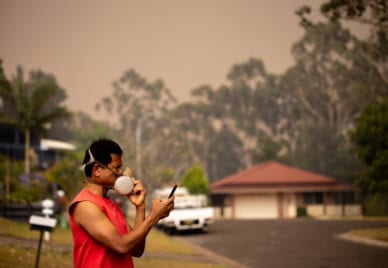
Aggregating and Integrating Data on Health Outcomes Associated with Bushfires at a National Scale
Exploreabout Aggregating and Integrating Data on Health Outcomes Associated with Bushfires at a National Scale
Collaboration among research, industry, business and government is critical for innovation in Australia. It drives productivity, economic growth, improves quality of living and planet health, and enables us to address some of the most pressing problems facing society, like healthcare and medicine, and food security.
An important step to enable this collaboration is connection. Better connection will help researchers and innovators find the collaborators and resources they need. This space is already evolving with:
The ARDC has a history of partnering with research organisations, building networks of data and people, providing national infrastructure and information services, with long-term interests in the ‘information ecosystem’ and promoting standards. To further boost the success of all services and activities that are linking universities and research organisations, businesses, industry and government, we are delivering the Research Link Australia (RLA) project with dedicated funding from the Australian Government’s National Collaborative Research Infrastructure Strategy (NCRIS).
The project will involve the development of a technical platform and a strategic framework that enable information sharing and improvement, connecting researchers and innovators. The platform will leverage the ARDC’s existing national data catalogue Research Data Australia, information standards, services, technology capabilities and networks.
We have adopted a consultative and co-design approach to working with government bodies, key data agencies, research-industry facilitators, businesses and research communities to ensure we develop and iteratively improve these capabilities together.
We have worked and will continue to work with community groups in focused activities to understand needs, identify data sources, and shape and test the design and deliverables of the project.
We have established an Advisory Committee with members from diverse backgrounds in research and industry collaborations. The members include:
By the end of Phase 1, we will deliver:
Phase 1 is expected to complete in the second quarter of 2024. The ARDC has committed to a further 3 years of operation, development and expansion beyond the dedicated NCRIS funding provided for Phase 1.
We will regularly share updates on the project on this page:
We have also published an interim report, which covers the project context, a draft Shared Strategic Framework, and an environmental scan of sector capabilities and gap analysis. Read the report.
We held a webinar introducing the project in May 2023. Watch the recording: